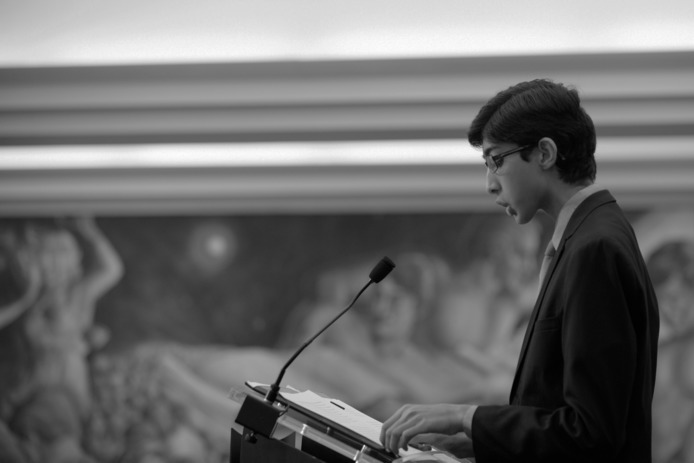Friday, June 01, 2018
The Case for Open Speech

by Alison Xin, 11th/12 Grade 2018 Hope and Stanley Adelstein Free Speech Essay Contest Winner, Hathaway Brown
No other checkpoint has had as much of an influence on how I’ve planned my actions, my goals, and my life as the goal of college education. For years, I’ve perceived university as a staging ground for independence, a launching pad for pursuing the frustratingly elusive phenomenon known as “adulthood.” The moment I cross that campus threshold, I expect to cast off the protective shells of a high-schooler – the daily familial support, the controlled schedule, the constant dependence on authority figures for guidance – and grab the reins of my life. Will the transition be easy? Should the transition be easy?
In short: No.
In slightly longer terms: No, on both counts.
Higher education should be just that – higher. It should elevate the student outside of their comfort zone. It should inspire, it should challenge, and it should provoke difficult decisions and uncomfortable questions. To realize this, learning institutions should on no grounds attempt to limit an available platform to speakers, even if – better yet, especially – if they’re controversial.
These simple concepts should also extend beyond the campus, as they contribute to more balanced progress in society as a whole, allowing the nature of public discourse to mature in the same way one would hope students to develop in educational environments. Exposure to different viewpoints ultimately enriches experiences, though it may appear a particularly bitter medicine. Gritting one’s teeth and waiting out an argument that appears regressive or offensive can be exceptionally difficult – I would know, having to endure quite a few formal and informal heated debates. But to listen, even without the intention to agree completely, helps the conversation. Understanding allows both sides the opportunity to fully flesh out arguments, paving the way for what should be the ultimate goal of a productive debate: reaching the most logical and supported conclusion. Affording the opposition respect, additionally, prevents the two sides of an issue from spiraling away from each other into entrenched echo chambers.
Are there exceptions? Of course, but far fewer than the most vocal opponents may advocate. As a guideline, if the speech would not be considered legally protected, then it may be reasonable prevent its dissemination. If it directly incites violence, or can be categorized as “fighting words”, the threat of substantial harm outweighs the benefits of acknowledging a novel viewpoint. Well, what about the elephant in the room? What if the simple action of inviting the speaker incites widespread pushback, potentially spiraling into violent protest? Though the line blurs a bit, these inflammatory stances should not be prohibited. The speaker, in these cases, does not endorse such actions with their content, and thus the responsibility does not lie with the institution to restrict their expression.
What responsibilities should those institutions who have taken up the task of encouraging discussion be expected to fulfil? Public pressure suggests that college campuses and forums should limit the floor to morally upright speakers. Apparently, only the voices determined to be most forward-looking should be raised to prominence, as even casting a meaningful sideways glance at “obstructionist” or “bigoted” speech threatens the upward momentum of society. And maybe in some cases, this outlook holds water. A charismatic racial supremacist may leave a lecture with a few more people tied to their cause. A caustic speaker may severely damage the self-esteem of audience members. An insensitive keynoter may accidentally feed into systematic oppression. On the other hand, insight can come from surprising sources. It is extremely unlikely than any single individual will hold nothing but undiluted hatred and antagonism in their heart and mind. People lean toward being dappled with flaws and strengths, including in their viewpoints. Faults in certain outlooks shouldn’t be taken as a be-all-end-all that overshadows legitimate assets that they may bring to the floor.
Furthermore, historically, the speakers most likely to be branded as threats to order or insane radicals moved toward positions such as gender and racial equality. These individuals were time and time again rejected for being too uncomfortable, too irregular to fit into a neat box of proper thinking and conduct. But, some may cry, that was different! Those people ended up being right! And yes, maybe in retrospect the correct course seems clear: racism bad, civil rights good. But everybody, in every single conflict of perspectives throughout history, spoke for what they honestly and earnestly thought was correct. Nobody knew for certain whether they would land on the “right” or “wrong” side of history – a phenomenon that should be a glaring red warning sign to anyone starting to drift toward absolutes when it comes to their viewpoint. To increase the chances of hitting upon what will ultimately be the best decision for the future of humanity, the table should be completely open for everybody to throw down their cards.
Only clear and present physical threat should limit a platform of free speech. From a university auditorium to a public stage, the risk of disagreement and confrontation should be accepted and folded into the essential fabric of debate – being willing and able to hear the other side. When I pick up my undergraduate syllabus and stumble my way through unfamiliar sprawling buildings, I expect to be caught off-balance by novel viewpoints. I expect to disagree and to clash and to forge my values in a kiln of impassioned controversy. And when I obtain up my degree and step out to an even more unfamiliar landscape, I don’t expect that process to stop. Improvement comes from adversity, and the first step to overcoming challenges is to be willing to accept and confront them.
This year’s 11th/12th grade winner of the 2018 Hope and Stanley Adelstein Free Speech Essay contest expounded on the following prompt.
"In the past year, college campuses from Berkeley to Middlebury have seen widespread student protests against speakers brought to their respective campuses. While many contend that students are exercising their right to protest, others argue that student protests have reached the point where they now drown out the voices they disagree with. This debate is not limited to educational settings; here at the City Club, we saw community members speaking both in favor and in opposition of Corey Lewandowski speaking from our stage. With these opposing perspectives in mind, how should institutions determine to whom they provide a public platform?"





